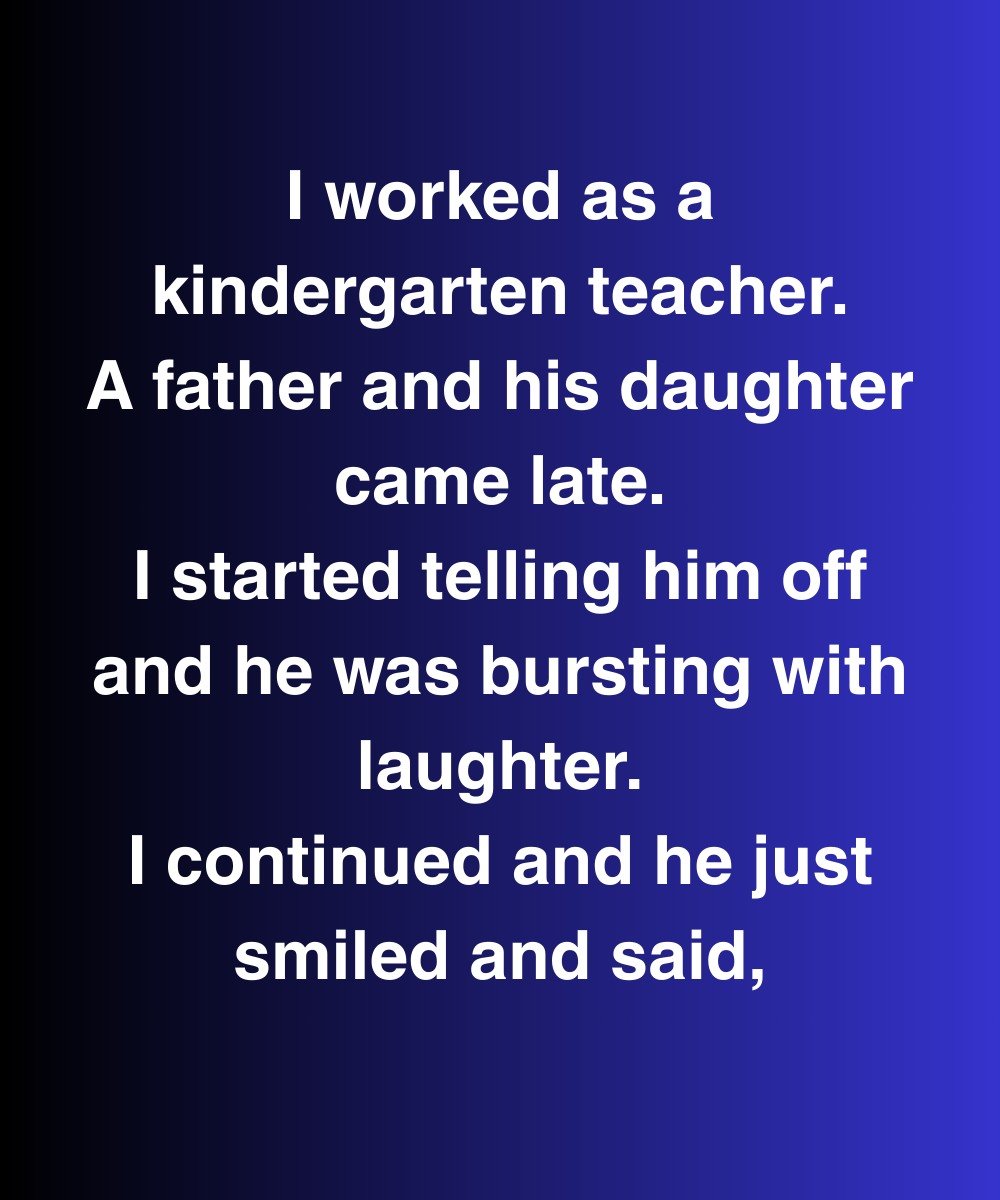I Worked As A Kindergarten Teacher—He Kept Showing Up Late, Until I Saw The Truth
I worked as a kindergarten teacher.
A father and his daughter came late.
I started telling him off and he was bursting with laughter.
I continued and he just smiled and said, “You sound exactly like her.”
I paused, mid-scold, a little thrown. “Like who?”
“My late wife,” he said, with a soft look on his face.
The classroom around us felt suddenly too bright. I glanced at his daughter—little blue dress, hair in two wild puffs, quietly unpacking her bag like this was any normal day. Like her mom hadn’t died. Like this wasn’t the third time this week they were 20 minutes late.
I swallowed the knot in my throat and softened my tone. “Okay. But try to be on time tomorrow, alright? We’re doing the butterfly release.”
He nodded, grateful. “I’ll try. Really.”
But the next morning? Same thing.
And again the day after that.
At first, I chalked it up to bad time management or him being disorganized. But by the second week, I noticed other things. His daughter, Yara, always had unmatched socks. Her hair was clean but clearly rushed. And some days she’d come in without a snack, or with a crumpled napkin holding dry cereal.
I tried to stay in my lane—I mean, I wasn’t about to insert myself into their lives. But I couldn’t help wondering: What was going on at home?
One Friday afternoon, I called him in after pickup. Not to lecture him. Just… to ask.
He looked tired. Like, truly tired. Shadowy eyes. Shirt half-tucked. He sat on the tiny kid chair across from me and rubbed his temples.
“Look,” I said gently, “Yara’s amazing. She’s bright, curious, kind. I just… I want to make sure everything’s okay. You’ve been running late, and I noticed some little things—snack, clothes—”
He looked up. “You think I’m neglecting her?”
“No,” I said quickly. “Not at all. I just want to understand.”
He exhaled, long and heavy. “I work nights. Warehouse. I get home around six, nap an hour, get her up, do breakfast, get her here. It’s a scramble.”
I nodded slowly. That explained a lot.
“My mom used to help,” he added. “But she’s got arthritis now. Can’t do mornings.”
My chest tightened. “That’s a lot on your shoulders.”
He chuckled dryly. “Yeah. You think you’re ready for single parenthood… then reality hits like a freight train.”
There was a pause. The classroom felt quiet—just the hum of the AC and the scratch of crayon on paper from a lingering student in the corner.
I didn’t say anything else. I just nodded and offered him a granola bar from the desk drawer. He took it, surprised.
The next week, I started keeping an extra snack in my drawer for Yara. Just in case.
I’d also slip her little notes—“You’re doing great!” or “I love how you helped Kai today!”—things I thought her mom might’ve said if she were around.
Over time, she started coming in with tidier hair. A cleaner uniform. A real lunch. He was trying. And I noticed.
One morning in March, he actually came on time. I teased him about it and he laughed, full belly-laugh this time. “Don’t get used to it.”
“I will,” I smirked.
He started hanging around a bit after drop-off. Not in a weird way—just chatting, decompressing. I think he was lonely.
One day, I asked, “Do you get any time for yourself?”
He laughed. “Define ‘time.’ Between work, chores, Yara’s meltdowns over socks that don’t sparkle—it’s like juggling knives.”
We both laughed. But I saw the fatigue behind it.
I suggested a few resources—childcare programs, a nearby support group for single dads. He took down the info, said he’d check it out.
A month later, I noticed he’d shaved. Wore a nicer shirt. Nothing flashy. Just… more put-together.
Something shifted.
Then came spring.
Our class was organizing the annual “Family Day.” Parents came in, helped with crafts, potluck-style lunch, story time.
He signed up. I was surprised, but glad.
The day of the event, he brought in mini meat pies—handmade. Even had Yara’s name written on the Tupperware. He stayed the whole time, helped the kids make paper flowers, even read a book to the class.
Afterward, I saw him standing alone, wiping his hands with a napkin. I walked over.
“Thanks for today. You crushed it.”
He smiled. “Yara begged me to come. She told me, ‘You can’t be late if it’s for lunch.’”
We both laughed.
Then he looked at me, almost shy. “Can I ask you something?”
“Sure.”
“You got any plans Friday night?”
My mouth opened. Closed. I blinked.
“I mean,” he added quickly, “not as a teacher. Just… as you.”
It took me a second. But I smiled. “I’m free after six.”
He beamed. “Good. I’ll pick you up at seven?”
“Only if you’re not late,” I teased.
Friday came. He wasn’t late.
We went to this tiny Ethiopian place tucked behind a laundromat. No-frills, amazing food. He told me stories—about his wife, their love story, how they met in college and eloped in Vegas.
He talked about her laugh. How Yara has her same way of scrunching her nose when she’s mad.
I listened. I laughed. I almost cried.
After dinner, we walked around the park near my apartment. It was quiet. Cool air, distant city lights.
He asked, “Is this weird? Us?”
“No,” I said honestly. “It feels… kind.”
That was the start of something. Not fireworks. Not rom-com dramatic. Just… gentle. Real.
We took things slow. Yara didn’t even know for months. When she found out, she blinked and asked, “Does that mean you can come over for pancakes?”
I said, “Only if I get extra syrup.”
By the end of summer, we were spending weekends together—museums, movie nights, backyard water fights. It was messy and beautiful and exhausting.
Then came the twist.
One Monday morning, I got called into the office. The director of the school looked tense.
“There’s been a complaint,” she said. “From another parent.”
My stomach dropped.
“They’re saying you’re dating a student’s father. That it’s a conflict of interest.”
I felt like I’d been slapped. “But I’m not doing anything inappropriate. Yara’s not being treated any differently.”
“I know,” she said, “but perception matters.”
Long story short, I was asked to step away from Yara’s classroom.
I had a choice: break things off or switch to a different class next year.
It hurt. I loved my students. I loved watching Yara grow.
But I chose to step aside. I didn’t want to hide. And I didn’t want to lie.
When I told him, he looked like he’d been punched.
“I’m so sorry,” he said. “This is my fault.”
“No, it’s not,” I said. “It’s just life. People talk.”
He took my hand. “Thank you. For choosing us.”
Fall came. I moved to a different class—older kids. Yara visited me at lunch sometimes, showing off her drawings or sneaking me gummy bears.
Her dad? He kept showing up on time. Every single day.
He even started a blog for single dads—“Late But Trying.” It went kind of viral. His posts were raw, funny, honest.
One of them read, “Sometimes, the woman who scolds you for being late ends up teaching you how to show up. Not just to school. But to life.”
We got married the next spring.
In a park. With picnic tables. Yara wore yellow and read a poem about butterflies. My students made paper flower bouquets.
It wasn’t fancy. But it was perfect.
I look back now and think about how close I came to writing him off. To seeing only the lateness and not the story behind it.
And I guess that’s the lesson:
Sometimes people are doing the best they can—and their best doesn’t look perfect.
Sometimes, showing up late still counts… as long as you show up.
If this made you smile, share it with someone who might need the reminder
And don’t forget to hit like if you believe in second chances.







